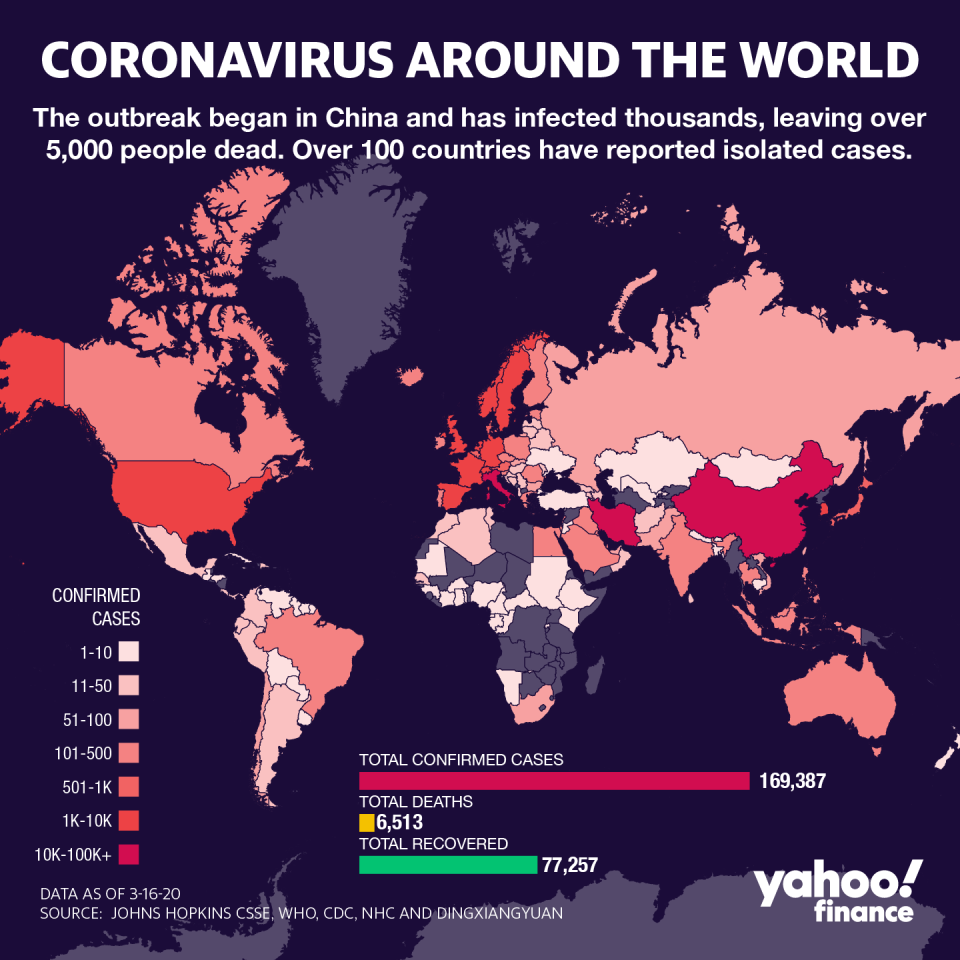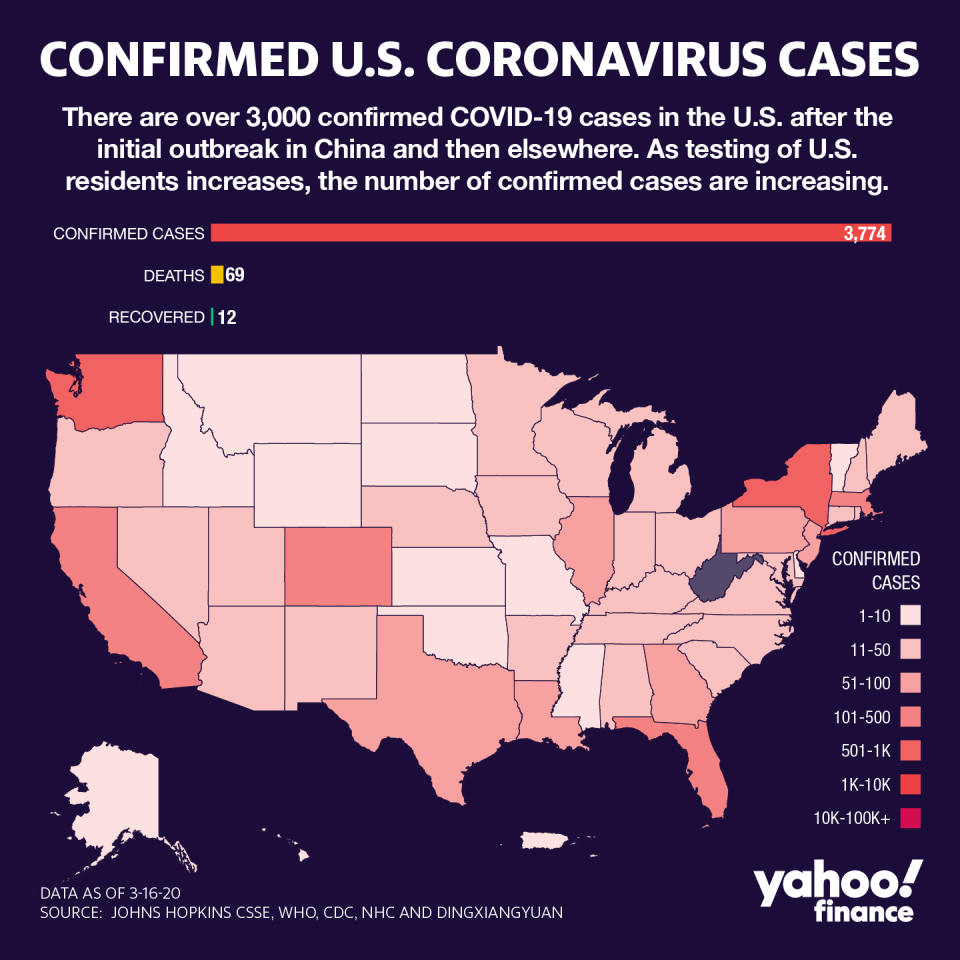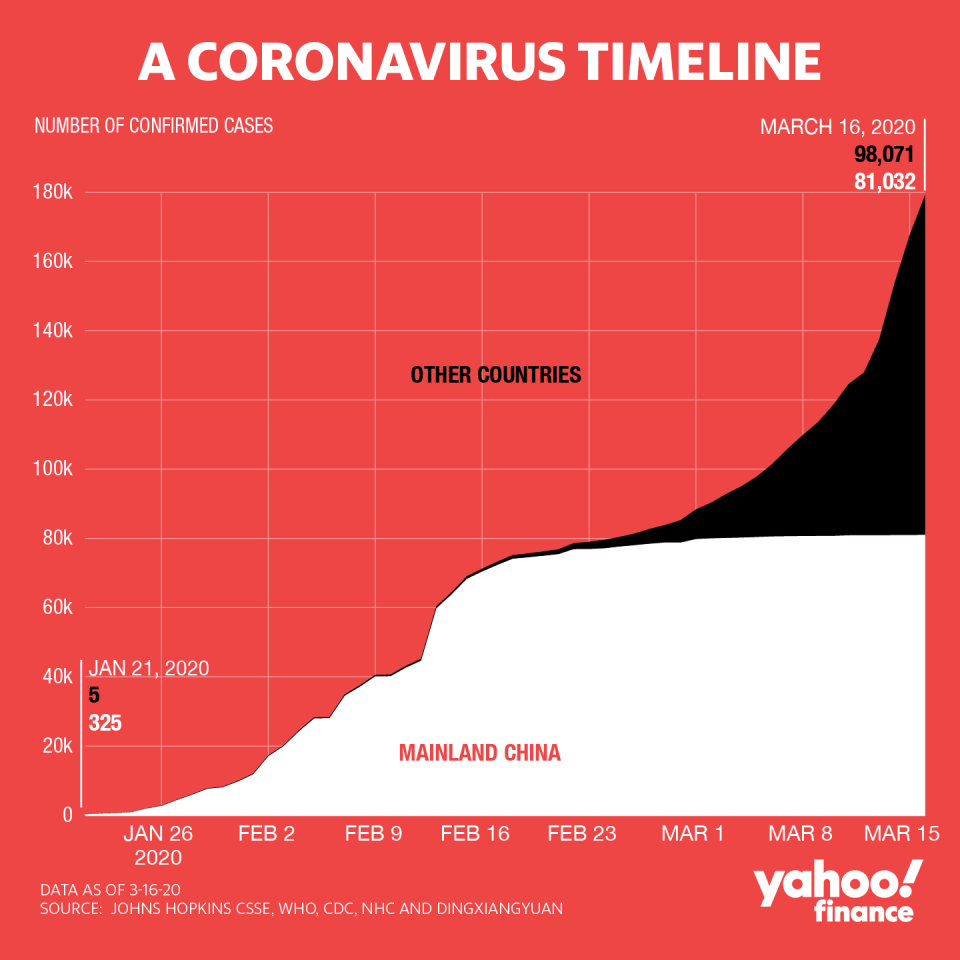Coronavirus update: NY, NJ, CT move to ban large groups as Trump warns crisis may drag on into the summer
Europe and the U.S. took dramatic steps to slow the coronavirus pandemic that’s killed over 6,000 people and sickened scores of others, as President Donald Trump on Monday warned the timeline for crisis mitigation may extend well beyond what was originally anticipated — which sent stock markets reeling.
“People are talking about July, August, something like that,” Trump said, adding that with the hefty losses in the stock markets, it is possible the country could go into a brief recession.
“The market will take care of itself" and will be "very strong" after the outbreak, he said.
The Centers for Disease Control urged the postponement or cancellation of large-scale events with 50 people or more for eight weeks in order to prevent more coronavirus infections, as new cases and fatalities mounted in Europe.
But on Monday, the White House coronavirus task force released its own guidelines, suggesting avoiding gatherings of 10 or more, and avoiding restaurants, bars, clubs and gyms. The guidelines did, however, defer to state and local governments— which have, in some cases, created stricter rules.
New York and California — which have the two largest clusters of COVID-19 cases in the United States — introduced sweeping efforts to combat the disease’s spread. Globally, cases are nearing 180,000, with more than 7,000 deaths.
Both the Empire and Golden State plan to shutter all schools and urged bars, restaurants and gyms to close voluntarily for at least two weeks, while San Francisco and the state of New Jersey imposed even stiffer requirements to keep people in.
Effective at midnight, San Francisco will require people to stay home except for essential needs.
Necessary government functions & essential stores will remain open.
These steps are based on the advice of public health experts to slow the spread of #COVID19.— London Breed (@LondonBreed) March 16, 2020
Since the World Health Organization formally declared the virus a pandemic last week, events have evolved at a rapid pace. A range of major businesses also opted to shutter temporarily, as fears mount that the outbreak will wreak havoc on the global economy.
The Federal Reserve made an emergency announcement Sunday afternoon by announcing that it would be cutting interest rates to zero. Vowing to use its “full range of tools” to battle the economic impacts of the coronavirus, the central bank also announced a new massive bond buying (quantitative easing) program of at least $700 billion.

The Fed’s move, however, did virtually nothing to calm a market that’s been in turmoil for nearly a month. Stocks plunged at Monday’s opening bell by over 9%, triggering market circuit breakers and sparking a massive flight to safety in bonds and gold.
“When the U.S. equity market declines by 12% or 10% in a matter of four or five days, that’s a major league event, that’s telling you something,” Desmond Lachman, a resident fellow at the American Enterprise Institute and former deputy director at the IMF’s policy development and review department, told Yahoo Finance.
“When you see the bond yield on the 10-year going below 1%, that’s telling you that markets are figuring out that this has a big impact,” he said in a recent interview, adding that investors were not impressed with the Trump administration’s readiness or pleas for calm.
“It’s a slow motion train wreck that will certainly, by the time of the election — at least I think— see a significant downturn in the United States,” Lachman added.

Social distancing takes effect
Cities and states around the U.S. have moved to contain social spreading of the disease by urging companies to let employees work from home, and have instructed citizens to stay indoors.
The world’s largest economy is slowly but surely moving toward an aggressive containment strategy, with cases topping 3,700 amid nearly 70 deaths.
California closed bars and nightclubs this weekend, and ordered restaurants to operate at 50% of their seating capacity. New York, New Jersey and Connecticut are also drastically limiting public gatherings, by ordering bars, nightclubs and gymnasiums to close by 8 p.m. on Monday.
Garden State officials took it even further, imposing a curfew between the hours of 8pm to 5am each day, with the exception of essential travel.
The weekend saw vast swaths of the country shut down schools, order employees to work from home, and saw major retailers shut their doors for at least two weeks.

Casinos in Las Vegas, New York and around the country will be closing. The industry took a big hit two months ago, when all casinos in Macau closed for two weeks as the outbreak ravaged Asia. However, travel and leisure industries have been all but incapacitated, with many companies reducing capacity or seeing a reduction in travel hit their bottom lines.
United Airlines (UAL) announced it expects a revenue plunge this year, with receipts already $1.5 billion lower than last year.
The strategy of “social distancing” has had a chilling impact on public life, leading to empty streets, canceled worship services and sporting events on hiatus indefinitely.
“Large events and mass gatherings can contribute to the spread of COVID-19 in the United States via travelers who attend these events and introduce the virus to new communities,” the CDC said on Sunday.
“Therefore, CDC, in accordance with its guidance for large events and mass gatherings, recommends that for the next 8 weeks, organizers (whether groups or individuals) cancel or postpone in-person events that consist of 50 people or more throughout the United States,” the organization added.
With the U.S. seen as far behind the curve on testing, calls are growing for the world’s largest economy to take far more heavy-handed steps to shut down its economy — moves that both Italy and Spain have taken as Europe becomes the next battleground in the effort to contain the virus.
Alphabet’s (GOOG) health arm, Verily, unveiled its pilot website in the Bay Area to filter out individuals who may need to be tested for the virus, but it was already overbooked Monday. The project was first announced by President Donald Trump last week, with expectations it will be rolled out as a nationwide tool, which appeared to be news to the company.
Amid worries about readily available testing, high-throughput tests from Roche and Thermo Fisher have received emergency use authorization from the Food and Drug Administration last week. However, those solutions aren’t expected for some time, stirring fears that the U.S. has yet to see the full scope of the outbreak.
Two commercial labs, Quest Diagnostics (DGX) and LabCorp (LH), have been providing testing. But one New Jersey hospital CEO told Yahoo Finance Monday the sensitivity of those tests is unknown and could be providing false positives.
LabCorp said “a result of negative does not definitively rule out infection with COVID-19. The test might not detect virus in an infected patient if the virus is not being actively shed at the time or site of sample collection. And individual response to the virus can differ.”
Meanwhile, the Trump Administration is working on rolling out drive-thru testing, at Walmart, Target, CVS and Walgreens locations around the country — initially focused on the hardest hit areas.
Anjalee Khemlani is a reporter at Yahoo Finance. Follow her on Twitter: @AnjKhem
Javier David is an editor for Yahoo Finance. Follow him on Twitter: @TeflonGeek
Read the latest financial and business news from Yahoo Finance
Follow Yahoo Finance on Twitter, Facebook, Instagram, Flipboard, SmartNews, LinkedIn, YouTube, and reddit.